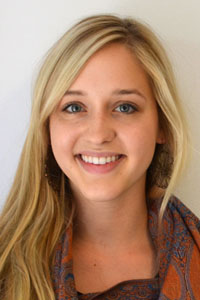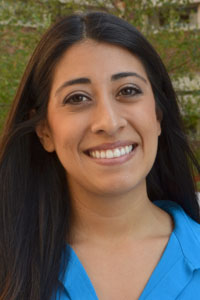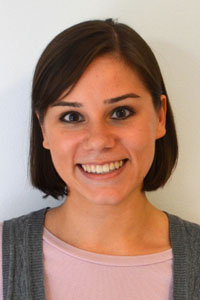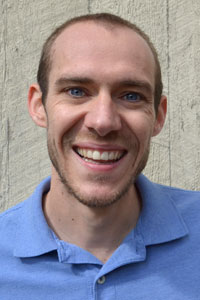Rattlinggourd Endowed Scholarship and Fellowship
Jennifer Bethune, Undergraduate, Public Health Major

Jennifer Bethune
Blond-haired and blue-eyed, Jennifer Bethune has struggled with her identity. She's white, but also a descendant of Native Americans from North Dakota – the Turtle Mountain Band of Chippewa Indians. Her grandfather grew up on a reservation before moving to the Pacific Northwest. "Growing up I was able to appreciate my ancestry in a really positive way, but until college I was really unfamiliar with the violence and oppression that was and is still being inflicted systematically on Native communities," says Bethune, of Orting, WA, a small town near Mt. Rainier.
In her junior year, Bethune says, "I learned about the pain, suffering and historical trauma linked to Native American identity. It's a type of trauma that's transferred from generation to generation." Communities suffering historical trauma typically have higher rates of suicide, substance abuse and domestic violence, she says.
Now Bethune is exploring her Native American connections while majoring in public health. In the future, she plans to do community-based participatory research after pursuing a master's degree in public health. She is driven by questions such as, "What does it mean to be healthy? What are some of the systematic disadvantages that endanger certain populations of people by making them at risk for certain disease or injury?" Bethune is interested in access to tools for healthy lifestyles, from culturally relevant fresh foods to places where people can exercise without fear of violence.
Thanks to the Rattlinggourd award, Bethune can cut back on her part-time hours as a barista and devote more time to her education, both personally and academically. "I really just want to learn," says Bethune. "I'm going to use this time to read a lot of books and meet with people who have taken this road before me. I want to know how to be an ally who acts with understanding, empathy and cultural humility."
The Rattlinggourd Endowed Scholarship and Fellowship was established by Dylan and Susan Wilbanks. It fosters public health advances in Native American and Alaska Native communities by providing support to students who demonstrate promise in public health and in working with underrepresented communities.
Grayston-Day Endowed Fellowship
Jonae Perez, MPH student, Nutritional Sciences

Jonae Perez
Jonae Perez applied to the UW because the Nutritional Sciences graduate program is "one of the best in the country," she says. She plans to earn her license as a Registered Dietitian and practice as a clinician while also promoting public health. "I really want to work clinically with children with special health-care needs, such as those with autism or neurological disorders," says the native of Moorpark in southern California. "And I hope to develop experiences that will help me pursue a future in maternal and child health policy development."
Perez has worked part-time during the school year and full-time during summers. "I had to support myself and I'm doing my best not to take out excessive student loans. This fellowship will allow me to fully dedicate all of my time to school," she says. Besides working full-time over the summer as a receptionist in a dental clinic, Perez also completed a research project for the Healthy Eating and Active Living unit of Public Health – Seattle & King County. She found only 10 percent of vending machines operated by the City of Seattle offered items that met the city's new Healthy Vending Guidelines.
Perez, a second-year student in Public Health Nutrition, studied kinesiology as an undergraduate at Cal State Long Beach and has long wanted to work in health care. She even took a year off to volunteer at a hospital. She plans to do her thesis on parental rules and the home-food environment under Dr. Brian Saelens, an adjunct professor of Health Services based at Seattle Children's Research Institute. "I'm really passionate about the preventive aspect of public health – fixing it before it happens," Perez says.
Arianna Miles-Jay, MPH student, Epidemiology

Arianna Miles-Jay
Arianna Miles-Jay has always been fascinated by infectious diseases, and has a desire to prevent others from getting sick. "I've just always been drawn to research," says the second-year MPH student.
A native of Clinton Township, MI, Miles-Jay studied microbiology and applied statistics at the University of Michigan. As an undergraduate, she researched the role of microbes in the oral and vaginal cavities of women in pre-term labor. That cohort was largely Hispanic or African-American. Miles-Jay identifies with her own Hispanic heritage. Her mother, from Puerto Rico, worked as an attorney in a male-dominated, mostly white, field in Michigan. It was a challenge for people like her mother. "Knowing the struggles they faced makes me appreciate the opportunities I have here," she says.
Miles-Jay plans to apply to the PhD program, perhaps focusing on the growing problem of hospital-acquired infections and antibiotic resistance. She is currently conducting research on infections in individuals whose immune systems are compromised at the Fred Hutchinson Cancer Research Center; she's also doing research on infection-control and prevention at the Seattle Cancer Care Alliance.
"I'm really excited to receive his fellowship," she said. "The funding situation is bleak right now, and fewer research assistantships are available. Not only do I get the stipend, but it waives the non-resident portion of tuition. It gives me some more freedom to pursue research that I'm passionate about."
The Grayston-Day Endowed Fellowship was established to honor the School's first two deans, Robert Day and Thomas Grayston. It supports outstanding graduate students who are underrepresented in the field of public health.
SPH Endowed Fellowship
Brad Wagenaar, PhD student, Epidemiology

Brad Wagenaar
Brad Wagenaar's life has been filled with service and adventure, and more is in store. After graduating from St. Olaf's College in Northfield, MN, Wagenaar cycled over 4,000 miles across the country to raise money for affordable housing with the organization Bike & Build; he stopped and volunteered to build homes along the way. Then he spent two years with the Peace Corps in northern Cameroon, posted to a health center in a remote village.
While studying for his MPH at Emory University, Wagenaar spent a summer in Haiti working on mental health issues such as depression, anxiety and suicide. Unlike many infectious diseases, diagnosis and treatment for mental illness is culturally bound. "The Western term 'depression' does not have an exact equivalence in Haitian vernacular," Wagenaar says. Often mental illness intersects with local religious and cultural beliefs in complex ways, all of which make simply exporting Western diagnosis and treatment problematic at best, or even harmful.
Now Wagenaar wants to improve mental health care and awareness in Mozambique, where a non-governmental organization affiliated with the UW, Health Alliance International, has long-standing ties. Like many developing countries, Mozambique has little data on mental health. Working with Dr. Kenny Sherr, Wagenaar hopes to study the burden of mental health, "create tools to understand it in the local context and language," and explore current and future options for care. "I've always been fascinated with the brain, with human experience, with psychology, with culture," he says.
Receiving the Endowed Fellowship means Wagenaar doesn't have to chase funding for projects that might not match his interests. "This allows me to have the flexibility to work with Dr. Sherr on things that I'm passionate about, and hopefully work towards an effective system of prevention and care for those suffering from mental disorders in Mozambique."
The SPH Endowed Fellowship is open to students from all departments in the School. Support is wide-ranging and ongoing from staff, corporations, former students, and friends of the School.
